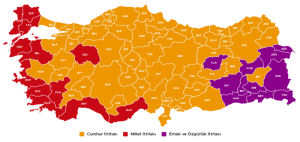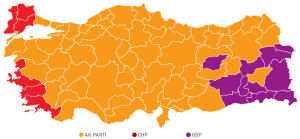The Republic of Turkey has functioned under a multi-party system since 1945, generally allowing a wide array of political groups to represent the population. However, the Turkish democracy has experienced four military interventions. The coup taking place in 1980 has swept Süleyman Demirel, who later founded the DYP party, away from premiership. In 1983, the military allowed Turkey to return to civilian power and appointed Turgut Özal, leader of ANAP party, as Prime Minister.
A new Constitution was drafted in 1982 and from 1987 onwards all political parties were allowed to participate in the elections, until the Refah (Wellfare) Islamist Party was dissolved in January 1998 and banned by the Constitutional Court.
The "Türkiye Büyük Millet Meclisi", the Great National Assembly of Turkey, has 600 members (was 550 until the Referandum in 2017) elected for a four-year term (used to be for 5 years until the Referendum in 2007) by proportional representation and conditional on a 10% nationwide vote threshold. With the referandum on 16th of April 2017 some articles of the Constitution was modified and Turkey adopted a new presidential system, where the president holds the Executive powers rather than the Prime minister, and the public vote is held every 5 years for both presidential and parliamentary seats.
| 2023 elections |
| 2018 elections |
| 2015 elections |
| 2011 elections |
| 2007 elections |
| Earlier elections |
| Major Parties |
2023 elections
The Presidential elections in Turkey was held on 14th of May 2023 with a record turnout of 87%. Since none of the four candidates for the presidency had the majority of the votes, the second and final run was held on 28th of May between the first two candidates: Mr. Erdogan and Mr. Kilicdaroglu. Mr. Erdogan got 52,18% of the votes and therefore he became the president of Turkey once again.
May 14th vote was not only for the presidency but for the parliament too. AKP and its coalition partners got a majority of 323 seats total, out of 600 seats. Looking individually at each political party, on May 14th AKP won 268 seats, CHP 169, YSP (former HDP) 61, MHP 50, IYI 43, YRP (Yeniden Refah) 5, and TIP (Workers' Party) 4.
In the general elections of 2023, three Alliances made their way to the Parliament:
- Cumhur Ittifaki (Republic Alliance) formed by AKP, MHP, YRP, BBP
- Millet Ittifaki (People's Alliance) formed by CHP, IYI, SP (Saadet Party), DP (Democrat Party), DEVA (Demokrasi ve Atilim Party), Gelecek Party
- Emek & Özgürlük Ittifaki (Labor & Freedom Alliance) formed by YSP, TIP
Below you can see the provinces won by political parties' alliances for the parliamentary seats during the elections of May 2023. Yellows are Cumhur Alliance, Reds are Millet Alliance, Purples are Emek & Ozgurluk Alliance.
2018 elections
First public elections after the modification of the Constitution by the 2017 Referandum, was done on 24th of June 2018 for the selection of the President and the Parliament. There were 6 candidates for the Presidency; Mr. Recep Tayyip Erdogan from AKP, Mr. Muharrem Ince from CHP, Mr. Selahattin Demirtas from HDP, Mrs. Meral Aksener from Iyi Party, Mr. Temel Karamollaoglu from Saadet Party, and Mr. Dogu Perincek from Vatan Party. Mr. Erdogan received 52,6% of the total votes so he became the new president of the Republic and formed his Cabinet for the government.
As for the Parliamentary elections, some political parties made strategic alliances in order to win the elections in certain provinces. At the end, the AKP got 42,6% of the total votes (290 deputies), the CHP got 22,6% (146 deputies), the HDP got 11,7% (68 deputies), the MHP got 11,1% (49 deputies), and Iyi Party got 10% (47 deputies). Other minor political parties and Independents couldn't pass the 10% threshold which is necessary to have a seat in the parliament.
In the elections of 2018, 86,20% turned into the polls which is one of the highest percentage of voters in a general election in Turkey; 51.183.729 voted out of 59.354.840 registered. The total of valid votes was 50.130.419.
Below you can see the provinces won by political parties for the parliamentary seats during the elections of June 2018. Yellows are AKP, Reds are CHP, Purples are HDP.
2015 elections
After the elections of 7th of June 2015, the 62nd Government has resigned according to the tradition. Since none of the political parties have won the majority of the seats during this last election, each party tried to form a coalition Government but no avail. After the deadlock, the President has decided for the early elections in Turkey on November 1st, 2015.
In the elections of June 7th AKP got 258 seats in the Parliament, CHP got 132 seats, MHP got 80 seats, HDP got 80 seats. Below you can see the provinces won by political parties during the elections of June and November in 2015. Yellows are AKP, Reds are CHP, Blue is MHP, and Purples are HDP.
The 63rd Government temporarily remained in power until the new government was established by the winner party AKP on November 24th. According to the official results of 1st of November 2015, the AKP won the majority of the Parliament with 49,50% of the total voters (317 deputies), the CHP got 25,32% (134 deputies), the HDP got 10,76% (59 deputies), and the MHP got 11,90% (40 deputies). Other minor political parties and Independents couldn't pass the 10% threshold rule hence remained outside of the Parliament for this term.
In the general elections in 1st of November, 85,23% turned into the polls; 48.537.695 voted out of 56.949.009 registered. The total of valid votes was 47.840.231, meanwhile 697.464 votes were not valid.
7th June 2015
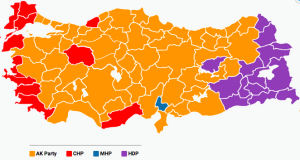
1st November 2015
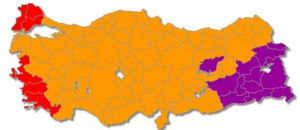
2011 elections
The legislative elections took place on the 12th of June 2011. Out of 50,3 million registered voters, 43 million voters came to the polls (85,45%). The AKP (Justice and Development Party) won the elections for the third time getting 49,91% of the total votes (in 2007 elections they got 46,58% and in 2002 34.27% of the total votes). The Prime Minister Mr. Recep Tayyip Erdogan formed the new Government and got the vote of confidence. The CHP got 25,92% (in 2007 was 20,88%) and MHP got 12,98% (in 2007 was 14,27%) of the votes. Meanwhile the independents, backed up by the Kurdish BDP, got 6,65% of the votes. Other political parties got a total of 4,55% of the votes so they couldn't pass the 10% threshold required go to the Parliament. With these votes, out of 550 total seats the AKP got 327 seats, CHP got 135 seats, MHP got 53 seats, and independents got 35 seats.
In the elections of 2002 there were only 23 women, in the 2007 elections there were 50 women, and finally in 2011 there were 78 of them. With the elections of 2011, the youngest member of the Parliament became Mr. Muhammet Bilal Macit (age 27) from AKP and the oldest became Mr. Oktay Eksi (age 79) from CHP.
Below you can see the provinces won by political parties during the elections of June 2011. The Yellows are AKP, Reds are CHP, Green is MHP, and Blues are Independents backed by BDP.
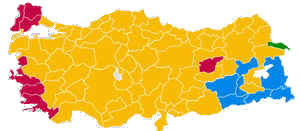
2007 elections
The elections took place on 22nd of July 2007, with the participation of 14 political parties (the previous elections took place in November 2002 and before that in April 1999). Out of 42,8 million registered voters, 36million have voted during that day (84,25%). The AKP (Justice and Development Party) won the elections with 46,58% of the total votes (in 2002 they've won with 34.27% of the total votes). Recep Tayyip Erdogan became the Premiere of the new Government. The CHP got 20,88% and MHP got 14,27% of the votes, so they became the opposition parties. All other political parties couldn't pass the 10% threshold thus stayed outside of the Parliament (DP or ex-DYP 5,42%, the GP 3,04%, SP 2,34%, and others less then 1%).
Surprisingly, the independent candidates got 5,24% of the votes and 26 of them managed to enter the Parliament. On the other hand, after the elections were over, some independent deputies or deputies hived away from the party they stood for, have resigned and joined different parties who were left out because of the 10% threshold. While officially there were only 3 political parties managed to get in during the 2007 elections (AKP, CHP, MHP), later on also DTP (Democratic Society Party), DSP, ODP (Freedom and Support Party) and BBP (Grand Unity Party) are represented in the Parliament thanks to these newly added members. In 2009, one of the deputies left his party and formed a new one under the name of TP (Turkey Party). Also in 2009, deputies of ODP and BBP changed their party again so these two parties didn't have any seats in the Parliament anymore.
With the elections of July 2007, for the first time in ten years after HADEP, pro-Kurdish candidates have won seats in the Turkish parliament. 24 independent candidates affiliated with the pro-Kurdish Democratic Society Party (DTP) were elected, and once in they've gathered under the DTP banner. According to the Turkish Law, 20 or more parliamentarians may form a political group inside the Parliament once elected. But in December 2009 the Constitutional Court banned, again, the DTP for their ties with the terrorist organization PKK. According to the Law, DTP is shut down and their MP's passed to a new party called BDP (Peace and Democracy Party).
Dramaticaly, a MHP deputy died in a car crash just days after the election. Therefore there was a vacant seat in the Parliament.
After the 2007 elections, the youngest member of the Parliament was 30 years old and the oldest was 83.
July 2007
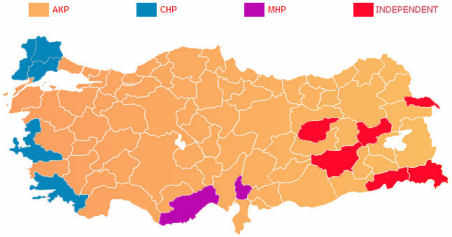
November 2002
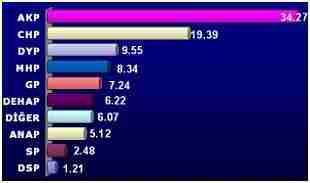
A comparison of the seats that political parties held in the Turkish Parliament after the elections of 1999 - 2002 - 2007 - 2011 is below:
| Party name | 1999 elections | 2002 elections | 2007 elections | 2011 elections |
|---|---|---|---|---|
| AKP - Justice and Development Party | 59 | 360 | 341 | 327 |
| CHP - Peoples Republican Party | 3 | 190 | 99 (there were 112, but 13 members passed to DSP) | 135 |
| MHP - National Movement Party | 124 | 0 | 70 | 53 |
| DSP - Democratic Left Party | 58 | 0 | 13 (there were none, but 13 members left CHP and passed to DSP) | 0 |
| ANAP - Motherland Party | 71 | 0 | 0 (quit before elections) | 0 |
| DYP (True Path Party) | 81 | 0 | 0 (entered as DP) | 0 |
| DTP - Democratic Society Party (pro-Kurdish) | n/a | n/a | 21 (there were none, but 21 independents passed to this party) | 0 |
| BBP - Grand Unity Party (far right) | n/a | n/a | 1 (a deputy changed into this party after elections) | 0 |
| ODP - Freedom and Support Party | n/a | n/a | 1 (a deputy changed into this party after elections) | 0 |
| TP - Turkey Party | n/a | n/a | n/a | 0 |
| YTP - New Turkey Party | 58 | 0 | n/a | 0 |
| SP - Felicity Party | 46 | 0 | n/a | 0 |
| Independents | 10 | 15 | 26 (many passed to DTP at the beginning) | 35 |
Main Political Parties
 AKP (Justice and Development Party) : Founded in 2001 as a pro-Islamist party by Tayyip Erdogan and Abdullah Gul, AKP gradually gained higher votes in each local and general elections surprising other political parties. In 2002 they won 34,3% of the total votes and became as the first party from the polls, with Abdullah Gül first as the Premiere, then Tayyip Erdogan after his political ban ended. All three coalition parties eliminated. CHP emerged as main opposition. For the first time in almost two decades, AKP ended up forming a single-party government. AKP rejects the "Islamist" label and claims that it is a pro-Western mainstream party with a "conservative" social agenda but also a firm commitment to liberal market economy and European Union membership. In the elections of 2007 they got 46,58% of the total votes and won the elections for the second time, bringing in 341 deputies. In 2011 they raised their votes to 49,91% and got 327 seats in the Parliament, forming the government for the third time. In June 2015 they lost their majority in the Parliament, getting 40,66% of the votes thus holding 258 seats. But then in November 2015 the elections were renewed and this time they got 49,50% of the votes with 317 seats, thus forming the new Government by Prof. Dr. Ahmet Davutoglu. In the elections of 2018 they received 42,6% of the total voters and sent 290 deputies to the Parliament. In the last general elections of 2023 they had 268 seats in the parliament. Today, the leader of the party is Mr. Erdogan.
AKP (Justice and Development Party) : Founded in 2001 as a pro-Islamist party by Tayyip Erdogan and Abdullah Gul, AKP gradually gained higher votes in each local and general elections surprising other political parties. In 2002 they won 34,3% of the total votes and became as the first party from the polls, with Abdullah Gül first as the Premiere, then Tayyip Erdogan after his political ban ended. All three coalition parties eliminated. CHP emerged as main opposition. For the first time in almost two decades, AKP ended up forming a single-party government. AKP rejects the "Islamist" label and claims that it is a pro-Western mainstream party with a "conservative" social agenda but also a firm commitment to liberal market economy and European Union membership. In the elections of 2007 they got 46,58% of the total votes and won the elections for the second time, bringing in 341 deputies. In 2011 they raised their votes to 49,91% and got 327 seats in the Parliament, forming the government for the third time. In June 2015 they lost their majority in the Parliament, getting 40,66% of the votes thus holding 258 seats. But then in November 2015 the elections were renewed and this time they got 49,50% of the votes with 317 seats, thus forming the new Government by Prof. Dr. Ahmet Davutoglu. In the elections of 2018 they received 42,6% of the total voters and sent 290 deputies to the Parliament. In the last general elections of 2023 they had 268 seats in the parliament. Today, the leader of the party is Mr. Erdogan.
 CHP (The Republican People's Party) : created in 1923 by Mustafa Kemal Atatürk, is now led by Mr. Kemal Kilicdaroglu. It has been a stronger center-left party since its fusion, in February 1995, with the then main left-wing party SHP. The fusion has however prompted many ex-SHP politicians to defect from the CHP party and join the DSP ranks. Many blamed the former for not being left-wing enough: Mr. Baykal, leader of CHP until May 2010, was indeed in favor of liberal economic policies and of the Customs Union in general. Following the general elections of April 1999, CHP - which obtained only 8.7% of the votes - disappeared from the Parliament for the first time in its history. ex-leader Mr. Baykal was seen as the responsible of this defeat and he lost the control of the party after the Extraordinary Grand Congress of CHP and he resigned. During the elections of 2002, ex-leader Mr. Baykal re-gained his seat and they were able to get 19.39% of the votes, thus became the second and the main opposition party in the parliament. In 2007 they joined their forces with DSP and got 20,88% of the votes, bringing in 112 deputies. After the elections, members from DSP have left the party and returned to their original party. In 2011 they got 25,92% of the votes and thus hold 135 seats. In November 2015 they got 25,32% of the votes and hold 134 seats. In the elections of 2018 they received 22,6% of the total voters and sent 146 deputies to the Parliament. In the last general elections of 2023 they gained 169 seats in the parliament.
CHP (The Republican People's Party) : created in 1923 by Mustafa Kemal Atatürk, is now led by Mr. Kemal Kilicdaroglu. It has been a stronger center-left party since its fusion, in February 1995, with the then main left-wing party SHP. The fusion has however prompted many ex-SHP politicians to defect from the CHP party and join the DSP ranks. Many blamed the former for not being left-wing enough: Mr. Baykal, leader of CHP until May 2010, was indeed in favor of liberal economic policies and of the Customs Union in general. Following the general elections of April 1999, CHP - which obtained only 8.7% of the votes - disappeared from the Parliament for the first time in its history. ex-leader Mr. Baykal was seen as the responsible of this defeat and he lost the control of the party after the Extraordinary Grand Congress of CHP and he resigned. During the elections of 2002, ex-leader Mr. Baykal re-gained his seat and they were able to get 19.39% of the votes, thus became the second and the main opposition party in the parliament. In 2007 they joined their forces with DSP and got 20,88% of the votes, bringing in 112 deputies. After the elections, members from DSP have left the party and returned to their original party. In 2011 they got 25,92% of the votes and thus hold 135 seats. In November 2015 they got 25,32% of the votes and hold 134 seats. In the elections of 2018 they received 22,6% of the total voters and sent 146 deputies to the Parliament. In the last general elections of 2023 they gained 169 seats in the parliament.
 MHP (National Action Party) : ultra-nationalist party (also known as the Grey Wolves, from the name of it's youth movement) founded in 1969 by the late Alparslan Türkes. Structured as a typically para-military organization, MHP was largely responsible for the escalation of violence in the late seventies. MHP was dissolved after the 1980 coup while Türkes and others were convicted in the early 80's for the murder of several public figures. In 1995, Türkes is allowed to reconstitute MHP and take part in the elections which earned the party 8.5% of the vote. Türkes' funeral in April 1997 drew 300.000 people including politicians of all parties. Türkes has been succeeded by Dr. Devlet Bahceli, in spite of the opposition inside the party of Tugrul Türkes, son of the party's founder. MHP became the second Turkish political party after the April 1999 general elections and got 129 seats in the National Assembly. It's leader Mr. Bahçeli is drawing a different profile than earlier leaders and bringing a new line for their politics different from their past. During the elections of 2002 they got only 8.34% of the votes and couldn't go to the parliament. But in 2007 they've got 14,27% of the votes and managed to bring 70 deputies in the National Assembly. In 2011 they got 12,98% of the votes, holding 53 seats in the Parliament. In November 2015 they got 11,90% of the votes and hold 40 seats. In the elections of 2018 they received 11,1% of the total voters and sent 49 deputies to the Parliament. In the last general elections of 2023 they formed an alliance with AKP and entered in the parliament with 50 deputies.
MHP (National Action Party) : ultra-nationalist party (also known as the Grey Wolves, from the name of it's youth movement) founded in 1969 by the late Alparslan Türkes. Structured as a typically para-military organization, MHP was largely responsible for the escalation of violence in the late seventies. MHP was dissolved after the 1980 coup while Türkes and others were convicted in the early 80's for the murder of several public figures. In 1995, Türkes is allowed to reconstitute MHP and take part in the elections which earned the party 8.5% of the vote. Türkes' funeral in April 1997 drew 300.000 people including politicians of all parties. Türkes has been succeeded by Dr. Devlet Bahceli, in spite of the opposition inside the party of Tugrul Türkes, son of the party's founder. MHP became the second Turkish political party after the April 1999 general elections and got 129 seats in the National Assembly. It's leader Mr. Bahçeli is drawing a different profile than earlier leaders and bringing a new line for their politics different from their past. During the elections of 2002 they got only 8.34% of the votes and couldn't go to the parliament. But in 2007 they've got 14,27% of the votes and managed to bring 70 deputies in the National Assembly. In 2011 they got 12,98% of the votes, holding 53 seats in the Parliament. In November 2015 they got 11,90% of the votes and hold 40 seats. In the elections of 2018 they received 11,1% of the total voters and sent 49 deputies to the Parliament. In the last general elections of 2023 they formed an alliance with AKP and entered in the parliament with 50 deputies.
 IYI (Iyi Party): A fairly young party founded in 2017 by Mrs. Meral Aksener after the separation of some members from MHP due to the low performance and poor outcome of the party in the general elections of 2015. Iyi Party is a nationalist party following the principles of Mustafa Kemal Atatürk. In the elections of 2018 they formed a strategic alliance with CHP and received 10% of the total votes and sent 47 deputies to the Parliament. In the last general elections of 2023 they formed an alliance with CHP again and entered in the parliament with 43 deputies.
IYI (Iyi Party): A fairly young party founded in 2017 by Mrs. Meral Aksener after the separation of some members from MHP due to the low performance and poor outcome of the party in the general elections of 2015. Iyi Party is a nationalist party following the principles of Mustafa Kemal Atatürk. In the elections of 2018 they formed a strategic alliance with CHP and received 10% of the total votes and sent 47 deputies to the Parliament. In the last general elections of 2023 they formed an alliance with CHP again and entered in the parliament with 43 deputies.
 HDP (People's Democracy Party) : HDP (Halklarin Demokratik Partisi) is a leftist Kurdish political party founded in 2013 to replace earlier Kurdish political parties. During the 63rd Temporary Government 2 members of HDP served for a short time in the cabinet until the elections were renewed in November same year. In the elections of November 2015 they got 10,76% of the total votes thus holding 59 seats in the parliament. In the elections of 2018 they received 11,7% of the total voters and sent 68 deputies to the Parliament. The current party leaders are Mr. Selahattin Demirtas and Mrs. Figen Yuksekdag. Note: HDP entered the general elections of 2023 with the name of YSL (Green Leftist Party).
HDP (People's Democracy Party) : HDP (Halklarin Demokratik Partisi) is a leftist Kurdish political party founded in 2013 to replace earlier Kurdish political parties. During the 63rd Temporary Government 2 members of HDP served for a short time in the cabinet until the elections were renewed in November same year. In the elections of November 2015 they got 10,76% of the total votes thus holding 59 seats in the parliament. In the elections of 2018 they received 11,7% of the total voters and sent 68 deputies to the Parliament. The current party leaders are Mr. Selahattin Demirtas and Mrs. Figen Yuksekdag. Note: HDP entered the general elections of 2023 with the name of YSL (Green Leftist Party).
 DSP (The Democratic Left party) : founded in 1985 by Rahsan Ecevit, wife of Bülent Ecevit (while he was banned from political life after the military coup of 1980), this centre-left party has been led between 1987-2006 by Bülent Ecevit. It was a minority party until it won 76 parliamentary seats in the December 1995 general elections. The DSP approves of Turkish membership in NATO and adhesion to the European Union although it criticized the content of the Customs Union. DSP, boosted by the capture of Abdullah Ocalan, leader of the terrorist PKK organization, while its leader was prime minister, won 22% of the votes in the general elections of April 1999 and took the most seats, 136, in the 550-member Turkish Parliament. It's leader, Bülent Ecevit was bound to be, for the fifth time, Prime Minister. During the elections in 2002 they got only 1.21% of the votes and couldn't go to the parliament. During the elections of 2007 they've joined forces with CHP and entered the elections. After entering the Parliament within CHP, 13 members have left and joined their original party. They couldn't go in the Parliament during the elections of 2011, 2015 and 2018 due to 10% treshold. Its chairman is Dr. Masum Turker.
DSP (The Democratic Left party) : founded in 1985 by Rahsan Ecevit, wife of Bülent Ecevit (while he was banned from political life after the military coup of 1980), this centre-left party has been led between 1987-2006 by Bülent Ecevit. It was a minority party until it won 76 parliamentary seats in the December 1995 general elections. The DSP approves of Turkish membership in NATO and adhesion to the European Union although it criticized the content of the Customs Union. DSP, boosted by the capture of Abdullah Ocalan, leader of the terrorist PKK organization, while its leader was prime minister, won 22% of the votes in the general elections of April 1999 and took the most seats, 136, in the 550-member Turkish Parliament. It's leader, Bülent Ecevit was bound to be, for the fifth time, Prime Minister. During the elections in 2002 they got only 1.21% of the votes and couldn't go to the parliament. During the elections of 2007 they've joined forces with CHP and entered the elections. After entering the Parliament within CHP, 13 members have left and joined their original party. They couldn't go in the Parliament during the elections of 2011, 2015 and 2018 due to 10% treshold. Its chairman is Dr. Masum Turker.
 FAZILET (The Virtue Party): In April 1997 the coalition government led by Mr. Erbakan fell apart under pressure of the military and the party was banned in January 1998 by the Constitutional Court. Leaders of Refah (Wellfare Party) immediately created a new party : "Fazilet", the Virtue Party. All the Refah deputies - at least those who were not deprived from their political rights - joined Fazilet. Fazilet, led by Recai Kutan, took part in the general and local Turkish elections of April 1999 but lost the leading position inherited from the Refah. With some 21.3% of the votes and 111 seats (out of 550) in the Parliament, it became the third political party in Turkey, behind the DSP of Bülent Ecevit and the MHP of Devlet Bahceli. Fazilet party was banned and closed in 2001, some of its members joined Saadet (Happiness) Party and some AKP.
FAZILET (The Virtue Party): In April 1997 the coalition government led by Mr. Erbakan fell apart under pressure of the military and the party was banned in January 1998 by the Constitutional Court. Leaders of Refah (Wellfare Party) immediately created a new party : "Fazilet", the Virtue Party. All the Refah deputies - at least those who were not deprived from their political rights - joined Fazilet. Fazilet, led by Recai Kutan, took part in the general and local Turkish elections of April 1999 but lost the leading position inherited from the Refah. With some 21.3% of the votes and 111 seats (out of 550) in the Parliament, it became the third political party in Turkey, behind the DSP of Bülent Ecevit and the MHP of Devlet Bahceli. Fazilet party was banned and closed in 2001, some of its members joined Saadet (Happiness) Party and some AKP.
 DYP (The True Path Party) : founded in 1983 by Süleyman Demirel (although banned from the elections after the coup of 1980 until 1987), is conservative and draws strong support from the countryside. Despite the fact that its political and economic program is almost identical to ANAP's, the two parties compete for power rather than cooperate to form strong coalitions. As a result, the division of the right has facilitated the Refah (Wellfare) islamist party's rise to power in 1995. In the 1991 general elections, the DYP obtained a narrow majority of votes and formed a coalition government with the centre left party SHP. In 1993, Demirel succeeded Özal as the President of Turkey and was replaced as head of the party and Prime Minister by Tansu Ciller. Economic reforms became the cornerstone of the DYP's policy under her leadership. Membership of NATO and other strategic alliances as well as the application to join the EU were enthusiastically maintained while the Customs Union with the EU was negotiated and concluded. After the April 1999 elections, DYP became the fifth party in Turkey, with 12% of the votes. During the elections in 2002, they got only 9.55% of the votes and couldn't go to the parliament. But thanks to some of the members who resigned from their political parties in power and joined DYP, the party was represented in TBMM automatically with 4 members. During the elections of 2007 they joined their forces with ANAP and changed its name as DP (Democrat Party) and its logo, but got only 5,42% of the total votes thus couldn't enter the Parliament. After this defeat, its leader Mr. Mehmet Agar has resigned. By the end of October 2009 they've merged with ANAP into a single party. Today, Mr. Cetin Ozacikgoz is the general secretary of the DP party.
DYP (The True Path Party) : founded in 1983 by Süleyman Demirel (although banned from the elections after the coup of 1980 until 1987), is conservative and draws strong support from the countryside. Despite the fact that its political and economic program is almost identical to ANAP's, the two parties compete for power rather than cooperate to form strong coalitions. As a result, the division of the right has facilitated the Refah (Wellfare) islamist party's rise to power in 1995. In the 1991 general elections, the DYP obtained a narrow majority of votes and formed a coalition government with the centre left party SHP. In 1993, Demirel succeeded Özal as the President of Turkey and was replaced as head of the party and Prime Minister by Tansu Ciller. Economic reforms became the cornerstone of the DYP's policy under her leadership. Membership of NATO and other strategic alliances as well as the application to join the EU were enthusiastically maintained while the Customs Union with the EU was negotiated and concluded. After the April 1999 elections, DYP became the fifth party in Turkey, with 12% of the votes. During the elections in 2002, they got only 9.55% of the votes and couldn't go to the parliament. But thanks to some of the members who resigned from their political parties in power and joined DYP, the party was represented in TBMM automatically with 4 members. During the elections of 2007 they joined their forces with ANAP and changed its name as DP (Democrat Party) and its logo, but got only 5,42% of the total votes thus couldn't enter the Parliament. After this defeat, its leader Mr. Mehmet Agar has resigned. By the end of October 2009 they've merged with ANAP into a single party. Today, Mr. Cetin Ozacikgoz is the general secretary of the DP party.
 ANAP (The Motherland Party) : founded in 1983 by Turgut Özal, ANAP stands in the center-right of the political spectrum. It governed Turkey from 1983 to 1991; formed a brief governmental coalition with the DYP in 1995 and then back to power from July 1997 to November 1998 with Mesut Yilmaz at its head. It transformed the Turkish economy in the eighties, introducing free-market reforms and down-sizing the public sector, and also applied formally to join the EEC (European Economic Community, today's EU) in 1987. While in opposition, ANAP criticized the Customs Union with the EU arguing that its terms were not in Turkey's interests. ANAP was one of the big looser in the April 1999 elections and became the fourth Turkish party with 14% of the votes. Following these elections, ANAP got 86 seats in the Parliament. During the elections in 2002, they got only 5.12% of the votes and couldn't go to the parliament. In 2007 they came to a deal with DP (Democrat Party, ex-DYP) and quit from elections in order to direct center-right votes to DP. As of October 2009, ANAP and DP has merged into one singe party, the Democrat Party (DP), therefore Anap doesn't exists anymore.
ANAP (The Motherland Party) : founded in 1983 by Turgut Özal, ANAP stands in the center-right of the political spectrum. It governed Turkey from 1983 to 1991; formed a brief governmental coalition with the DYP in 1995 and then back to power from July 1997 to November 1998 with Mesut Yilmaz at its head. It transformed the Turkish economy in the eighties, introducing free-market reforms and down-sizing the public sector, and also applied formally to join the EEC (European Economic Community, today's EU) in 1987. While in opposition, ANAP criticized the Customs Union with the EU arguing that its terms were not in Turkey's interests. ANAP was one of the big looser in the April 1999 elections and became the fourth Turkish party with 14% of the votes. Following these elections, ANAP got 86 seats in the Parliament. During the elections in 2002, they got only 5.12% of the votes and couldn't go to the parliament. In 2007 they came to a deal with DP (Democrat Party, ex-DYP) and quit from elections in order to direct center-right votes to DP. As of October 2009, ANAP and DP has merged into one singe party, the Democrat Party (DP), therefore Anap doesn't exists anymore.
 GP (Genc Parti - Young Party): Founded in 2002 by a young businessman, Mr. Cem Uzan. It's a liberal republican party. During the elections in November 2002, they miraculously got 7.24% of the votes in only 3 months of political life, but still couldn't go to the parliament because of 10% threshold for seats in the National Assembly. In the elections of 2007 they got 3,04% of the total votes thus couldn't go into the Parliament. Today, its leader Mr. Uzan is facing several trials held in the Turkish courts for some of his activities when he was a businessmen and now he lives abroad in order to avoid a possible arrest warning from the court.
GP (Genc Parti - Young Party): Founded in 2002 by a young businessman, Mr. Cem Uzan. It's a liberal republican party. During the elections in November 2002, they miraculously got 7.24% of the votes in only 3 months of political life, but still couldn't go to the parliament because of 10% threshold for seats in the National Assembly. In the elections of 2007 they got 3,04% of the total votes thus couldn't go into the Parliament. Today, its leader Mr. Uzan is facing several trials held in the Turkish courts for some of his activities when he was a businessmen and now he lives abroad in order to avoid a possible arrest warning from the court.
 HaDeP (People's Democracy Party) : a Kurdish political party which was established in 1994 to replace the DeP party (closed down by a court order). HaDeP took part in the 1995 elections and won 4.2 % of the vote. Prevented by the 10% threshold system to enter the Parliament, it gave most of its votes to the Welfare (Refah) Party so as not to waste them. HaDeP was the only legal party allowed to represent Kurdish interests (unlike the outlawed PKK). The party took part in the April 1999 municipal and general elections. Once again, HaDeP failed to reach at the national level the 10% threshold for seats in the National Assembly but won massively in some cities in the south-eastern regions of Turkey (in Agri, Batman, Bingöl, Diyarbakir, Siirt, Van, etc.). After these elections, the party was banned by the Constitutional Court and renamed as DEHAP. During the last elections in 2002, they got only 6.22% of the votes and couldn't go to the parliament. DEHAP was banned in 2005 and changed its name into DTP (Democratic Society Party). The DTP members entered in the 2007 elections as independent candidates from their provinces to bypass the 10% threshold barrier, and 21 of them succeded and elected in the Parliament almost after 10 years. Once inside, these independent deputies joined under the DTP banner and formed their group. But in December 2009 the Constitutional Court, country's top legal authority, banned the DTP for their ties with the terrorist organization PKK. 37 DTP executives, including two MP's, were banned from politics for five years thus bringing the total number of DTP deputies from 21 to 19 rapresentatives in the Parliament and therefore, according to the Law, DTP had to be shut down. Their MP's have resigned as a reaction to the verdict, but then they decided to continue with the BDP (Peace and Democracy Party). In the elections of 2011 they backed several independent MP's who got 36 seats in the Parliament. Their voters and deputies are running for HDP now.
HaDeP (People's Democracy Party) : a Kurdish political party which was established in 1994 to replace the DeP party (closed down by a court order). HaDeP took part in the 1995 elections and won 4.2 % of the vote. Prevented by the 10% threshold system to enter the Parliament, it gave most of its votes to the Welfare (Refah) Party so as not to waste them. HaDeP was the only legal party allowed to represent Kurdish interests (unlike the outlawed PKK). The party took part in the April 1999 municipal and general elections. Once again, HaDeP failed to reach at the national level the 10% threshold for seats in the National Assembly but won massively in some cities in the south-eastern regions of Turkey (in Agri, Batman, Bingöl, Diyarbakir, Siirt, Van, etc.). After these elections, the party was banned by the Constitutional Court and renamed as DEHAP. During the last elections in 2002, they got only 6.22% of the votes and couldn't go to the parliament. DEHAP was banned in 2005 and changed its name into DTP (Democratic Society Party). The DTP members entered in the 2007 elections as independent candidates from their provinces to bypass the 10% threshold barrier, and 21 of them succeded and elected in the Parliament almost after 10 years. Once inside, these independent deputies joined under the DTP banner and formed their group. But in December 2009 the Constitutional Court, country's top legal authority, banned the DTP for their ties with the terrorist organization PKK. 37 DTP executives, including two MP's, were banned from politics for five years thus bringing the total number of DTP deputies from 21 to 19 rapresentatives in the Parliament and therefore, according to the Law, DTP had to be shut down. Their MP's have resigned as a reaction to the verdict, but then they decided to continue with the BDP (Peace and Democracy Party). In the elections of 2011 they backed several independent MP's who got 36 seats in the Parliament. Their voters and deputies are running for HDP now.


